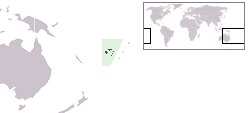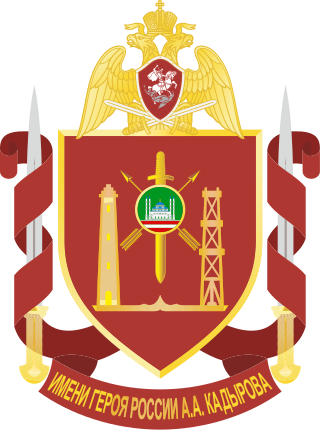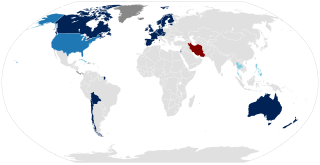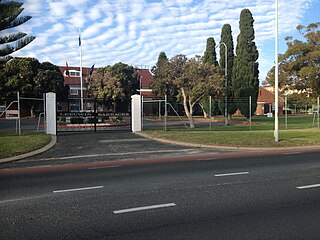Related Research Articles

Sexual harassment is a type of harassment involving the use of explicit or implicit sexual overtones, including the unwelcome and inappropriate promises of rewards in exchange for sexual favors. Sexual harassment can be physical and/or a demand or request for sexual favors, making sexually colored remarks, showing pornography, and any other unwelcome physical, verbal, or non-verbal conduct of a sexual nature. Sexual harassment includes a range of actions from verbal transgressions to sexual abuse or assault. Harassment can occur in many different social settings such as the workplace, the home, school, or religious institutions. Harassers or victims can be of any gender.

The Singapore Armed Forces (SAF) are the military of the Republic of Singapore, responsible for protecting and defending the security interests and the sovereignty of the country. A component of the Ministry of Defence (MINDEF), the armed forces have four service branches: the Army, Navy, Air Force, and Digital and Intelligence Service. An integrated force, it is one of the most capable, robust, technologically sophisticated and powerful militaries in the Southeast Asia region. The SAF is headed by the chief of defence force, appointed by the President, on the advice of the Cabinet.
Lesbian, gay, bisexual, transgender, and queer (LGBTQ) personnel are able to serve in the armed forces of some countries around the world: the vast majority of industrialized, Western countries including some South American countries, such as Argentina, Brazil and Chile in addition to other countries, such as the United States, Canada, Japan, Australia, Mexico, France, Finland, Denmark and Israel. The rights concerning intersex people are more vague.

Lesbian, gay, bisexual, and transgender (LGBT) rights in Fiji have evolved rapidly over the years. In 1997, Fiji became the second country in the world after South Africa to explicitly protect against discrimination based on sexual orientation in its Constitution. In 2009, the Constitution was abolished. The new Constitution, promulgated in September 2013, bans discrimination based on sexual orientation and gender identity or expression. However, same-sex marriage remains banned in Fiji and reports of societal discrimination and bullying are not uncommon.

The 141st Special Motorized Regiment, colloquially known as the Kadyrovites or the Akhmat special forces unit, is a paramilitary organization in Chechnya, Russia, that serves as the protection of the Head of the Chechen Republic. The term Kadyrovtsy is commonly used in Chechnya to refer to any armed, ethnically-Chechen men under the control of Head of the Chechen Republic Ramzan Kadyrov, although nominally they are under the umbrella of the National Guard of Russia. As of 2023, the regiment's official commander was Adam Delimkhanov, a close ally of Kadyrov.
United Kingdom employment equality law is a body of law which legislates against prejudice-based actions in the workplace. As an integral part of UK labour law it is unlawful to discriminate against a person because they have one of the "protected characteristics", which are, age, disability, gender reassignment, marriage and civil partnership, race, religion or belief, sex, pregnancy and maternity, and sexual orientation. The primary legislation is the Equality Act 2010, which outlaws discrimination in access to education, public services, private goods and services, transport or premises in addition to employment. This follows three major European Union Directives, and is supplement by other Acts like the Protection from Harassment Act 1997. Furthermore, discrimination on the grounds of work status, as a part-time worker, fixed term employee, agency worker or union membership is banned as a result of a combination of statutory instruments and the Trade Union and Labour Relations (Consolidation) Act 1992, again following European law. Disputes are typically resolved in the workplace in consultation with an employer or trade union, or with advice from a solicitor, ACAS or the Citizens Advice Bureau a claim may be brought in an employment tribunal. The Equality Act 2006 established the Equality and Human Rights Commission, a body designed to strengthen enforcement of equality laws.
The Gay Police Association (GPA) was a British police staff association with members in all 52 UK police forces. The GPA was founded in 1990 by Constable James Bradley as LAGPA, and represented the needs and interests of gay and bisexual police officers and police staff in the United Kingdom. Other founding officers were Iain Ferguson, Ashley Wilce and Tony Murphy. The founding of the GPA for England and Wales also inspired satellite organisations in Scotland in 1990 and Northern Ireland in 2003.

Lesbian, gay, bisexual, transgender, and queer (LGBTQ) people in the Gambia face significant challenges not experienced by non-LGBTQ residents. Same-sex sexual activity is illegal for both men and women in the Gambia. Criminalisation commenced under the colonial rule of the British. The 1933 Criminal Code provides penalties of prison terms of up to fourteen years. In 2014, the country amended its code to impose even harsher penalties of life imprisonment for "aggravated" cases. The gender expression of transgender individuals is also legally restricted in the country. While the United States Department of State reports that the laws against homosexual activity are not "actively enforced", arrests have occurred; the NGO Human Rights Watch, reports regular organised actions by law enforcement against persons suspected of homosexuality and gender non-conformity.

Women currently make up 19.2% of the ADF workforce. Women have served in Australian armed forces since 1899. Until World War II women were restricted to the Australian Army Nursing Service. This role expanded in 1941–42 when the Royal Australian Navy (RAN), Australian Army and Royal Australian Air Force established female branches in which women took on a range of support roles. While these organisations were disbanded at the end of the war, they were reestablished in 1950 as part of the military's permanent structure. Women were integrated into the services during the late 1970s and early 1980s, but were not allowed to apply for combat roles. In January 2013, serving women were allowed to apply for all positions in the Australian Defence Force (ADF) except special forces which became open to women in January 2014. In January 2016, civilian women became able to direct entry to all positions.
Canadian military policy with respect to LGBT sexuality has changed in the course of the 20th century from being intolerant and repressive to accepting and supportive.

Lesbian, gay, bisexual, transgender, and queer (LGBTQ) people in the U.S. state of Kentucky still face some legal challenges not experienced by other people. Same-sex sexual activity in Kentucky has been legally permitted since 1992, although the state legislature has not repealed its sodomy statute for same-sex couples. Same-sex marriage is legal in Kentucky under the U.S. Supreme Court ruling in Obergefell v. Hodges. The decision, which struck down Kentucky's statutory and constitutional bans on same-sex marriages and all other same-sex marriage bans elsewhere in the country, was handed down on June 26, 2015.

Gay and lesbian citizens have been allowed to serve openly in His Majesty's Armed Forces since 2000. The United Kingdom's policy is to allow lesbian, gay, bisexual, transgender, and queer (LGBTQ) personnel to serve openly, and discrimination on a sexual orientation basis is forbidden. It is also forbidden for someone to pressure LGBT people to come out. All personnel are subject to the same rules against sexual harassment, regardless of gender or sexual orientation.

Sexual orientation and gender identity in the Australian military are not considered disqualifying matters in the 21st century, with the Australian Defence Force (ADF) allowing LGBT people to serve openly and access the same entitlements as other personnel. The ban on gay and lesbian personnel was lifted by the Keating government in 1992, with a 2000 study finding no discernible negative impacts on troop morale. In 2009, the First Rudd government introduced equal entitlements to military retirement pensions and superannuation for the domestic partners of LGBTI personnel. Since 2010, transgender personnel may serve openly and may undergo gender transition with ADF support while continuing their military service. LGBTI personnel are also supported by the charity DEFGLIS, the Defence Force Lesbian Gay Bisexual Transgender and Intersex Information Service.
Women currently make up 14.8% of the Canadian Armed Forces, and are eligible to serve in all occupational specialties. The last occupational ban for females in the military was in 2001. In February 2018 the total representation of women who served in combat arms was reported as 4.3%. No women currently serve in combat specialties within special operations forces. Females who obtain officer status are mainly concentrated in the personnel and nursing fields.
A construction soldier was a non-combat role of the National People's Army, the armed forces of the German Democratic Republic, from 1964 to 1990. Bausoldaten were conscientious objectors who accepted conscription but refused armed service and instead served in unarmed construction units. Bausoldaten were the only legal form of conscientious objection in the Warsaw Pact.

Not all armed forces have policies explicitly permitting LGBT personnel. Generally speaking, Western European militaries show a greater tendency toward inclusion of LGBT individuals. As of 2022, more than 30 countries allow transgender military personnel to serve openly, such as Argentina, Australia, Austria, Belgium, Bolivia, Brazil, Canada, Chile, Czechia, Denmark, Estonia, Finland, France, Germany, Greece, Ireland, Israel, Japan, Mexico, the Netherlands, New Zealand, Norway, Spain, Sweden, Switzerland, Ukraine and the United States. Cuba and Thailand reportedly allowed transgender service in a limited capacity.

Sexual harassment in the military is unwanted sexual behaviour experienced as threatening, offensive, or otherwise upsetting, which occurs in a military setting.

Military service of intersex people varies greatly by country. Some armed forces such as the Australian Defence Force fully embrace intersex people in the modern era, while others such as the United States Armed Forces have vague rules or policies or treat the subject on a case by case basis.

James Wharton is the author of Out in the Army: My Life as a Gay Soldier and Something for the Weekend': Life in the Chemsex Underworld and an LGBT activist. Wharton was born in Wrexham on the first of January 1987, and grew up in the nearby village of Gwersyllt. In 2009, he garnered attention by featuring on the cover of Soldier Magazine – the official monthly publication of the British Army – as an openly gay trooper in the Blues and Royals. Wharton came out as gay to his regiment in 2005, aged 18 and just six years after the army's discrimination against gay people was declared a breach of human rights by the European Court of Human Rights. Before 2000, Wharton could have been court-martialled.
This overview shows the regulations regarding military service of non-heterosexuals around the world.
References
- ↑ Ministry of Defence [internet] http://www.mod.uk/DefenceInternet/Home
- 1 2 3 4 5 Davies, Q., Clark, B., and Sharp, M. (May, 2008). "Report of Inquiry into National Recognition of our Armed Forces, Report to the Prime Minister".
- 1 2 3 Fletcher, Hannah (5 September 2008). "Soldier forced to sleep in car after hotel refuses him a room". The Times . Archived from the original on May 8, 2009. Retrieved 13 July 2011.
- ↑ "Soldiers banned from pubs in Stamford". BBC News. 6 July 2002. Archived from the original on 22 May 2009. Retrieved 13 July 2011.
- ↑ Staples, J. (2008). "Soldier is turfed out of hotel for being in Army". Metro, 5 September 2008, p.5
- 1 2 Graf Pahlen, K. and Idris, T., "Joining Forces", Solicitors Journal, Vol. 153 no 43, 17 November 2009.